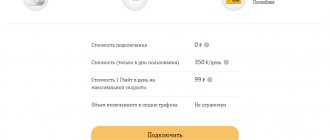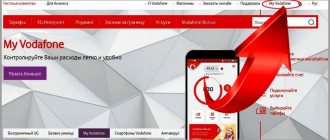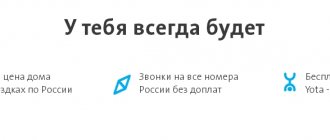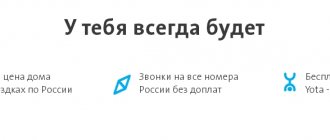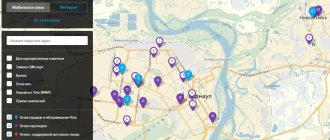Connecting international roaming
To access communication services within countries, check the availability of connected international roaming.
MTS
The MTS operator offers three services:
- "Easy roaming and international access."
- "International and national roaming."
- "International access".
Use your personal account or the My MTS mobile application to connect. It is also recommended to connect for calls with a negative balance.
Megaphone
MegaFon requires connection to the same name in company stores, via chat in the application or by calling 8-800-550-05-00. When visiting the office, take your passport with you.
Beeline
On Beeline, when using a prepaid system, the necessary for travel is connected automatically. In countries where online roaming does not work, keep track of your balance - it should have more than 600 rubles (it turns off at 300 rubles). On a postpaid system, connect .
Roaming on Tele2, Yota, Tinkoff Mobile and Danycom is available to all subscribers by default; no additional services are required.
What is mobile roaming?
The concept of “roaming” or “roaming” comes from the English word “roam”, which translated means “to wander, wander”. The technology first became available after the advent of GSM mobile communications. Connecting to such a service opens up the opportunity for the subscriber to make calls from almost anywhere in the world where cellular communications are supported.
The principle of roaming is quite simple. If the call is made outside your home country or the territory of your mobile operator, the signal is first transmitted to the nearest cell tower, and then to the local substation. For the service to work correctly, support is required from the foreign operator through whose equipment the signal passes. Not a single company will agree to use the resource of its towers for free, so the local mobile operator pays a certain amount specified in the contract. This is precisely why roaming is so expensive for ordinary users.
Roaming abroad from MTS
To reduce communication costs when traveling abroad, activate the “Foreign” option from MTS:
- The subscription fee starts from 350 rubles/day.
- Incoming calls are free.
- Outgoing – consumed from the basic package.
- Internet – from 5 to 100 MB/day at maximum speed, depending on the country of location of the subscriber.
In popular countries, the monthly fee is 350 rubles/day, in other countries – 390 rubles/day. There is also a list of countries where the option does not work - these are the Caribbean Islands, Haiti, Cuba, Dominica, South Ossetia, Turkmenistan and other destinations. The list of popular countries includes South Korea, Abkhazia, Estonia, Australia, Sweden, Armenia, Switzerland, Great Britain, Czech Republic, Hungary, France, Germany, Finland, Greece, Ukraine, Denmark, Turkey, Egypt, Thailand, Israel, Taiwan, India, USA, Italy, Romania, Spain, Portugal, Canada, UAE, Qatar, Norway, Latvia, Netherlands, Malta and Lithuania.
To connect the option, dial the USSD command *111*771#. It is available on the “Ultra”, “Tariffische”, “Smart Top”, “Our Smart”, “X”, “Smart”, “My Unlimited”, “Smart +”, “Smart NonStop” and “Smart Unlimited” tariffs.
We recommend checking the current lists of countries on the MTS website - they often change without warning from the operator.
Megaphone
MegaFon is an operator that at one time had the most interesting offers for foreign roaming by default - without including additional services. They extended to the Eurotariff zone. With the onset of the economic crisis, roaming prices increased sharply. Currently, users have access to the options “Whole World” (for calls), “Internet abroad” and “Vacation-Online” (for mobile Internet) and a number of SMS options.
“Whole World” option (free inbox). Inclusion - *131*1#
, turn off -
*131*1#
Coverage area - all MegaFon roaming countries. Subscription fee - 39 rubles per day; For this money you will receive 30 free incoming minutes every day. From the 31st minute of the day, the cost of calls will be charged according to the roaming tariffs of the host country.
MegaFon has a good offer “Vacation-online”
, offering mobile Internet at 19 rubles per megabyte in European countries, the European part of the CIS, Turkey, and Israel.
Activation of the service - *105*0060*1#
.
The connection fee for 30 days is 30 rubles. If you need certain Internet packages (10 or 30 MB), you need to enable the “Internet abroad” option. Connecting the option is free; in Europe, a 10 MB package will cost 129 rubles, 30 MB - 329 rubles. More expensive in other countries.
Roaming abroad from Beeline
Communication services during foreign trips for Beeline subscribers are charged in accordance with (connected automatically). The cost depends on the country of residence:
- CIS – package of 20 minutes for 200 rubles (hereinafter 10 rubles/min), 40 MB for 200 rubles (hereinafter 5 rubles/MB), SMS – 30 rubles/piece.
- Europe and popular countries – package of 20 minutes for 200 rubles (hereinafter 10 rubles/min), 40 MB for 200 rubles (hereinafter 5 rubles/MB), SMS – 30 rubles/piece.
- Other countries – incoming at 25 rubles/min, outgoing – 100 rubles/min, mobile Internet – 90 rubles/MB, SMS – 30 rubles/piece.
Check the lists of countries on the official Beeline website, as they may change. In countries where the option is not valid, an alternative tariff has been established - incoming and outgoing calls at 200 rubles / min, Internet - 15 rubles / 20 KB, SMS - 30 rubles / piece.
Beeline has created a special tariff for subscribers for international travel “All for 1800 + roaming”.
The tariff includes 15 GB of mobile Internet, 3000 minutes to any Russian numbers, 3000 SMS within Russia. The subscription fee is 1800 rubles/month. The mobile Internet package at the “All for 1800 + roaming” tariff is valid throughout Russia and in popular countries - for example, Mexico, Australia, Japan, Saudi Arabia and Germany.
For active Internet users, the “Unlimited Internet in roaming” option has been prepared. It includes unlimited access in the CIS and popular countries for only 350 rubles/day. To connect, dial *110*20171#, to disconnect - *110*20170#.
Useful services
Here are some useful services from the operator that make Megafon roaming easier around the country and the world.
MegaTraveller
The service was created to help users when traveling. You will be able to see the price of services, connect or disconnect them, and learn about operator promotions.
Free to use. You can use it like this:
- Dial *139#;
- A menu with sections will open.
Back call
If this option is supported, the outgoing call will be interrupted, after which the system itself will contact the contact and connect you to the subscriber if the call is successful.
You can use it like this:
- Dial 0500 is free.
Or like this:
- The service will automatically turn on for international calls when using the “Business Travel” and “Around the World” tariffs.
Roaming abroad from MegaFon
The cost of communication services from MegaFon when traveling abroad depends on the destination. It also depends on the tariff plan used. Travelers are offered the “Roaming, Goodbye” option, valid in popular countries:
- The subscription fee is 349 rubles/day.
- Outgoing calls to Russia are charged at home region prices.
- Mobile Internet is deducted from the package included in the tariff.
To activate the option, use your personal account or dial the USSD command *135#.
For active Internet users, the “Online World” option is available for 649 rubles/day; it includes unlimited Internet in 78 countries. To connect, dial *136# or visit your personal account. MegaFon also offers subscribers packages of minutes:
- 25 minutes in the CIS countries and Europe – 349 rubles;
- 50 minutes in the CIS and Europe – 549 rubles;
- 25 minutes worldwide – 899 rubles;
- 50 minutes worldwide – 1,499 rubles.
Connect the selected package through your personal account.
For those who receive calls more often than make calls themselves, the “Whole World” option has been prepared. It includes 40 minutes of incoming calls for 109 rubles/day. To connect, send the USSD command *131*1#.
Tariff comparison
Megafon has a large number of tariffs for use in roaming. Unfortunately, many TPs are now unavailable for connection, because the company decided to move them to the archives. But, customers will always be able to subscribe to the “Whole World” tariff, which has a low cost and provides many opportunities, for example, receiving incoming calls for free.
But, if you still choose a tariff for roaming, then I suggest choosing “Roaming, goodbye”, despite its cost, it allows you to use communications in many countries outside of Russia.
Roaming abroad from Tele2
International roaming rates from Tele2 vary depending on the destination. The minimum cost for incoming and outgoing calls is 15 rubles/min. This is the tariff that applies in most European countries. The cost of 1 MB of received/transmitted data is from 25 rubles. The following options will help you save on communication services and make roaming abroad cheaper:
- “Unlimited Internet abroad” – 350 rubles/day upon registration of access to data transfer. The option is valid in popular countries (check the list on the website).
- “Internet abroad”, in the CIS countries, Europe and Vietnam - 100 rubles per 10 MB.
- “Internet abroad”, everywhere except European and CIS countries – 300 rubles per 10 MB.
- “Conversations without borders” - incoming at 5 rubles/min in almost all countries of the world, with the exception of Madagascar, Turkmenistan, Angola, Lebanon, Andorra, Iraq, Seychelles and Maldives.
To connect options, use your personal account. Don't forget to turn them off when you get home to avoid unnecessary subscription fees.
A guide for the novice roamer
Many owners of mobile phones had to travel abroad or at least outside their region. Some go on vacation to the south once a year, others often go on business trips, and some travel constantly. In this case, a situation inevitably arises when a phone connected to one operator is serviced in the network of another operator - roaming (from the English roaming - wandering). In Russia, there is the concept of intranet roaming: using your operator’s network outside your home zone. In both cases, it is not the terms of the tariff plan that apply, but the prices set by the guest operator. Roamers will have to forget about all sorts of “favorite” numbers, free incoming calls from mobile phones (including on-network), per-second billing, “preferential” time, “free” minutes provided for a certain monthly fee and other amenities available only on the home network. Even checking your balance (with the exception of USSD requests) and calling customer service will be charged.
However, many subscribers use their phone in roaming in the same mode as at home. This leads to quite significant sums being written off from the account, the disappearance of which is often attributed to the “theft” of the operators. However, roaming is a very convenient and useful service that allows you to stay connected while traveling and spend quite reasonable money if done correctly. We will limit ourselves to considering roaming in the GSM standard, since other standards (DAMPS, CDMA) are less common in Russia and in the world, and roaming in them, although possible, is often difficult.
Before you leave:
1. Make sure that your tariff plan includes roaming service. There are tariffs for which roaming is not available or is limited (for example, the Megafon-Lite family in some regions). In this case, you can change your tariff plan or get another connection to the same or another operator. In this case, you will receive another number, which you can give only to the right people, or you can forward it to it from the old one. If they often call you on a regular number, without knowing that you are in roaming, there is a risk of spending a large amount.
In every major city in Russia and the CIS there are from two to five GSM operators. For traveling around the country, it is preferable to connect to large national operators that have a developed network in the regions (in Russia these are MTS, Bee Line and Megafon, in Ukraine - UMC and Kyivstar), and for traveling abroad it is better to choose an operator with the most favorable prices for international roaming .
For frequent trips, it is advisable to choose a tariff without a monthly fee (or with the lowest monthly fee) and without prepaid traffic - so that under normal conditions, telephone costs are minimal or non-existent. The cost of calls on your home network is not important: roaming prices do not depend on the tariff plan. The ideal tariffs are “Super-Jeans”, “Jeans-007” (MTS) and “Bi+Time”, “Bi+Boom” (Bee Line): there are no mandatory payments and no restrictions on the payment period, only fee for caller ID, which you don’t have to use. The only condition: at least once every six months you must make a charged call or send an SMS, otherwise the operator has the right to terminate the service contract.
2. If you intend to travel without leaving Russia - for example, to go to a neighboring region or on vacation in Sochi, you can limit yourself to intranet roaming. You just need to check with the help desk or on the operator’s website whether it operates in the desired city. For Bee Line and MTS subscribers, intranet roaming is enabled by default.
In addition to intranet, there is national (across Russia) and international roaming. To activate “full” roaming, MTS subscribers need to visit the subscriber department and write an application, and in Bee Line (users of “Bi+” tariffs) it is enough to deposit an amount exceeding 50 USD into their account. Other operators have different roaming connection conditions: check them with the help desk or subscriber department. Make sure that there is a sufficient amount in the account: the money may suddenly run out as soon as the operator receives bills for roaming (which does not happen immediately: in particularly advanced cases, bills can take 1-2 months), and top up the balance outside your region and Moreover, it is very problematic abroad.
3. It is desirable that the operator provides the ability to manage a personal account and services via the Internet. In MTS this can be done by ISSA (Internet subscriber service system), in Bee Line - beeoffice, in Megafon - “Service Guide”. Be sure to activate these services and set a password for access! This can only be done while in the home zone.
To avoid charging problems outside your home network, disable all unnecessary additional services, primarily voicemail, conference calling, call waiting and call hold. It is advisable to leave only Caller ID (automatic number identification) and, if necessary, data transfer. When roaming, you need to use forwarding with great care. If call forwarding is set to “busy” (the phone will be “busy” if you press the “hang up” key without answering the call), no answer (the subscriber does not answer the phone) or unreachability (the phone is turned off or out of network coverage) to voicemail or to another number, then you risk paying twice! If the phone was not turned off, but lost the network, the call will be directed to the network in which the phone was last registered and then forwarded. In this case, you will be charged for a call to your place of stay and for an outgoing call at the rates of the guest operator, and you will not even suspect it until you see the invoice. As a last resort, you can set up unconditional forwarding or unavailable forwarding, and then be sure to turn off the phone. In this case, you will only pay for a call from your city to the number to which call forwarding is set.
4. Find out which operators operate in the city or country you are traveling to, which of them your operator has a roaming agreement with, and whose tariffs are the most favorable. You can find out about the coverage area of GSM operators, for example, here (however, the information there is very approximate), or on the websites of the operators themselves. Information about roaming tariffs must be provided by your operator: it is recommended that you print them out and take them with you. The most detailed information, along with links to the websites of other operators, is contained on the MTS website, which is worth a look even if you are not a subscriber of this company.
5. If you plan to travel outside the former USSR, you need to purchase special adapters and/or chargers for foreign electrical networks, having found out in advance what voltage and sockets they use. To travel to North and South America, you also need a phone operating in the GSM-1900 or GSM-850/1900 standard. Regular dual-band handsets (GSM-900/1800) will work without problems in Europe, most of Asia and Africa, but they are useless in America. However, there are many tri-band (GSM-900/1800/1900) phone models. In Japan, South Korea and some South American countries, you can rent a local phone and insert your SIM card into it, but if you plan to stay in these countries for a long time, it is easier and cheaper to purchase a phone locally.
Roaming: how it works
Roaming in a guest network is possible only if there is a special agreement between operators. If there is no such agreement, or the roaming service is not activated, then the phone will not be able to register on the network. In the home zone (for Moscow this is the Moscow and neighboring regions, for St. Petersburg - the North-Western region, abroad - as a rule, the entire territory of the country) roaming in other networks is impossible, and outside it it is possible to use the services of several networks at once.
When you turn on or come within range of any network, the phone starts searching for the network. If the network in which the phone was last registered is not detected, then registration occurs in the network with the highest signal strength (in automatic search mode), or you are asked to select a network from the list (manual mode). It is recommended to set the automatic search mode so that each time the phone detects a network, it does not ask permission to register in it, but after that, perform a manual search and, if possible, select the network with the most favorable prices. For example, in the Penza region there are three GSM operators: SMARTS, Megafon and Bee Line. An MTS subscriber can choose two networks - SMARTS and Megafon (roaming in Bee Line is prohibited). Incoming calls from both operators cost approximately the same - 0.85 USD. excluding VAT in Megafon and 0.81 in SMARTS. But a local outgoing call in Megafon costs 1.56 USD, and in SMARTS it costs only 0.55. But the free threshold for outgoing calls in Megafon is 10 seconds (you can talk in intervals of 9 seconds or ask to be called back). And in some places, for example, at the junction of small European countries, you can find yourself in the coverage area of a dozen or more different cellular networks!
Networks are divided into home (home), forbidden (forbidden), preferred (preferred) and available (available). The home network is the network of the “native” operator, and if it is available, it is advisable to register with it: in this case, uniform and relatively low intranet roaming prices will apply, compared to other operators. You can try to register in all networks - sometimes the “forbidden” network allows roaming, while the “available” one remains inaccessible. Thus, Moscow MTS subscribers, while in St. Petersburg, can register both in the MTS network and in Megafon, despite the fact that Megafon is a prohibited network in the home zone. You can set preferred networks so that the phone “sticks” to them first and does not jump to other available networks. For the above example of roaming in St. Petersburg, it is advisable to set the MTS network as the preferred one, since calls to the Megafon network will cost much more.
Depending on the phone model, the MTS network can be recognized as MTS, RUS MTS, MTS RUS (in Belarus - 257 02, BY 02, MTS BY); Megafon - like MegaFon, MEGAFON, NWGSM, RUS NWGSM, North-West GSM, etc. Sometimes instead of the network name you can see numbers: 250 03, RUS 19, CC 250 NC 20, etc. This means that in the firmware (software) of the phone there is no information about this operator (which does not prevent the phone from working in this network), and the screen displays not the name of the operator, but the network code. Each GSM network has its own five-digit code (not to be confused with the telephone code!) The first three digits (CC, country code) are the country code, the last two (NC, network code) are the operator code. Thus, the SS of Russia - 250, Ukraine - 255, Belarus - 257; CC 250 NC 01 - MTS, 02 - Megafon, 99 - Bee Line). Sometimes an SPN (service provider name) is written on the SIM card - a logo displayed on the display instead of a network code: for example, Jeans (MTS) subscribers see the inscription “MTS RUS”, regardless of the phone model and its firmware. On some phones, the SPN is also visible when roaming in other networks next to the name of the guest network.
If the phone cannot register in any network (in this case, instead of the operator’s name, the inscription “SOS only”, “112 only”, “SOS only”, etc. appears on the screen), then, as a rule, you can call for free number 112. Depending on the operator, the call will be directed to the rescue service, police/police or helpline. Calls to 112 are possible even in the absence of a SIM card and from a locked keyboard.
The largest service area in Russia is MTS. In the regions in which the network of MTS and its subsidiaries operates, as a rule, communications are available in all major cities and on highways. In addition to Russia, the MTS network operates in Belarus and Ukraine (UMC). The MTS website has very detailed large-scale coverage maps. The MTS network has a unified payment acceptance system and “federal” payment cards that allow you to pay for a phone in almost all regions where MTS operates. The disadvantage of MTS intranet roaming is the different cost of calls to the regional/regional center and beyond. Outgoing calls to the region in roaming cost 20 cents more than a call to the regional center, even if the subscriber calls to the city in which he is currently located! And calls to any federal numbers of other operators are charged at the maximum rate - 0.74 USD. At the same time, calls to any MTS phone cost only 19 cents, incoming calls (including incoming calls from MTS) and outgoing local calls cost 29 cents.
Bee Line coverage is comparable to MTS coverage in the Central region and Western Siberia and significantly exceeds it in the Caucasus and Volga region (data as of early 2005). However, Bee Line only recently began operating in the north-west of Russia and the Urals, and is completely absent in Eastern Siberia and the Far East. The coverage maps on the website are less detailed and do not always correspond to reality - sometimes they only show the planned coverage. Another disadvantage of Bee Line: the need to have 50 USD. on the account for connecting national and international roaming. With a smaller amount on the account, the phone will be able to register only in the Bee Line network, as well as in the Kyivstar (Ukraine) and Turkcell (Turkey) networks. Roaming is disabled when the account balance drops to 20 USD. The undoubted advantages of Bee Line include the availability of GPRS throughout almost the entire coverage area, as well as unified “Bi+” payment cards throughout Russia.
The third operator, Megafon, works well in the North-West region, the Volga region, the Urals and the Caucasus. In other places, Megafon's coverage is still very limited. Unified payment cards appeared quite recently and are not sold in all regions, so problems may arise with account replenishment. There are also no uniform help desk numbers: if in MTS and Bee Line, by dialing 0890 and 0611 (or 0622), respectively, you can contact a local call center for free (which, if necessary, can switch to a subscriber service in your city), then in Megafon such there is no possibility. A distinctive feature of Megafon is its roaming-free space within one licensed zone (for example, the Volga region or the Urals). Thus, a Megafon subscriber, having left for a neighboring region, does not fall into roaming, like MTS or Bee Line subscribers, but continues to use the phone at the same tariff and under the same conditions as at home. In other licensed zones, intranet roaming operates, and the cost of all incoming and outgoing calls within Russia in this case is the same - 25 cents + VAT.
Intranet roaming is also available in the networks of large regional operators: SMARTS, covering almost the entire Volga region from Yaroslavl to Astrakhan; Tele 2.
Regardless of where the subscriber is located, his phone number remains unchanged, and you can call him in the same way as if the called subscriber was in his own city. Each “federal” code (903xx, 910xx, etc.) corresponds to a specific region and operator, and calls to it are paid in the same way as to landline numbers, that is, free from the “home” city, and from other places - as intercity In some countries, including CIS countries (Ukraine, Kazakhstan), calls to cell phones from regular phones are paid, regardless of where the subscriber is located, but incoming calls to cell phones are free.
Dialing rules vary from network to network. Sometimes you can call your host city without a code, but most often it is required. The common dialing format is + [country code] [city code] [number]. In case of a call to Moscow: +7 095 xxxxxxxx, to Kyiv: +380 44 xxxxxxxx. It is recommended to store numbers in the phone's address book in international format (via “+7”, not “8”), especially since to send an SMS the number must be entered this way. However, in some CIS countries it is advisable to dial numbers in the traditional way: 8?10-[country code] - this can be much cheaper. Thus, the operator Geocell (Georgia) charges calls to numbers dialed through + [country code] almost 5 times more expensive than calls dialed through 8?10! And some operators allow you to call using IP telephony at lower rates - in this case, the dialing rules differ from those indicated above.
In roaming, all calls are much more expensive than at home, and incoming calls are paid at long-distance rates. All calls will be charged only per minute, that is, for a conversation lasting 1 minute. 1 sec. They'll charge you two minutes. Therefore, it is not cheap for subscribers of the same company located in the same place to call each other: one will pay for a call home, and the other will pay for an incoming one. The cost of an incoming call consists of two parts: the cost of a call from the city in which you are connected to the place where you are (according to the tariffs of your operator) and the cost of an incoming call according to the tariffs of the guest network. Foreign operators, as a rule, do not charge money for incoming calls (exceptions are rare), so it makes no difference which network you register with for incoming calls: You only pay your operator for call delivery. But in Russia and Ukraine, depending on the choice of network, the cost of an incoming call may differ several times!
As for outgoing calls, you can get good money with them. For example, in Spain and some other European countries, in addition to the usual per-minute tariff, a connection fee is charged, which will be charged even if the called subscriber has not picked up the phone or is unavailable. In the US and Canada, the call time is counted from the moment the call is made, not from the moment it is connected.
When calling local cellular networks, it makes sense to choose exactly the network whose subscriber you are calling: calls to subscribers of other networks can cost much more. Free thresholds in each network are different and can vary from 3 to 10 seconds, or be absent. But you shouldn’t trust the meter readings on your phone - billing is carried out solely on the basis of the switch data, and it can count that you’ve talked a second more and charge you for a full minute. In the case when incoming calls are significantly more expensive than outgoing ones, you can “bounce” calls and call back to the specified numbers.
To avoid unnecessary costs, you can communicate via SMS or temporarily connect to a local operator (see below). All GSM operators support the ability to send SMS (short message service) - text messages to other phones, not only from handsets, but also via the Internet, by e-mail and ICQ. Unlike a call, the cost of which in roaming can reach 1-2 dollars, an SMS will cost 5-20 cents. Incoming SMS is usually free (exceptions are extremely rare), and on some networks outgoing messages may also be free. Using mobile Internet and WAP while roaming is also fraught with significant costs. Services based on GPRS/EDGE (including MMS) are charged at rates that are much higher than the tariffs of Russian operators: the cost of 1 MB can reach 10-15 dollars. Regular WAP (using a dial-up connection) will be charged as a long-distance or international call using the WAP gateway number, so it makes sense to change the WAP settings by specifying the access number of the guest operator. If you use your phone as a regular dial-up modem, then it is better to purchase an Internet access card from a local provider and access the network through its modem pool.
To check your balance, you can use SMS, USSD or an Internet service if the operator provides these services. In the first case, you can send a message to a special number (or use the SIM menu), and in response you will receive a message about your current balance. In your home zone this service is free, but in roaming you will have to pay for outgoing SMS. In the second case, you need to dial a certain combination of numbers (for example, *102#) and the call button, and information about the balance will be displayed directly on the phone display. In this case, you do not pay for the request, even while roaming. In the same way, you can activate express payment cards, connect and disable additional services.
Pre-paid
Pre-paid (prepaid) - services provided on an advance payment basis. In this case, it is the ability to connect to a mobile operator without concluding a contract. When you arrive in another city or country, you can purchase a SIM card from a local operator, receiving a local number and the ability to make calls at lower rates than with roaming. Usually, you don’t even need to present documents for this (although in Russia they will certainly require a passport). There is no subscription fee, and payment is made using express payment cards, which sometimes have a limited validity period - for example, 7 or 30 days, after which the SIM card can be thrown away, given as a gift to someone, or postponed until the next trip. The lifespan of a blocked SIM card is from 3 to 6 months: during this time it can be renewed. Russian operators also have prepaid: in Bee Line it is Bi+, in MTS it is Jeans, in Megafon it is Light. Tariffs and connection conditions vary in different cities. Typically a starter kit costs $5-10. In Moscow you can buy a set of “Jeans” or “Bi+” for 5 USD. on the account for 50-100 rubles, and during various promotions, SIM cards can be offered at a symbolic price or even free.
It should be noted that Russian operators usually indicate tariffs in conventional units, but these “cu.” are not equal to US dollars. Most often, the tariffs do not take into account VAT (18%), which is written in small letters at the very bottom of the price list or advertising poster. Therefore, all figures must be multiplied by the tax rate. Bee Line adds 1% to the dollar exchange rate, and regional operators can use an internal rate that differs markedly from the official one. However, in the regions tariffs in rubles are often used, including VAT.
It doesn’t always make sense to connect to local operators: sometimes it’s cheaper to use roaming. It is necessary to take into account that if the connection cost is, for example, 20 dollars, there may be only 5 on your account, which will be enough for 2-3 calls home. And if there is a larger amount in the account, then it may not be completely repaid in a few days. If you only need outgoing communication, then it is easier to use a payphone or intercom.
The cost of local outgoing and intercity calls from prepaid is sometimes comparable to the cost of similar calls from a roaming phone. Incoming calls are usually free (abroad) or cost the same as local calls (in Russia). Therefore, receiving calls to a local number is more profitable than to a roaming number, especially since the call is paid not by you, but by the caller. Calls within the network are also beneficial - they are often cheaper than calls within the city/country and are free for the receiving party. So, if you are traveling alone or in a group, periodically separating, you can connect to the same operator and communicate with each other at a price that is not comparable to the cost of a direct call in roaming.
Roaming abroad from Yota
Like other operators, the cost of international roaming from Iota depends on the chosen destination. In Belarus, the cost of Internet will be 20 rubles/20 MB, the next 20 MB are free. 30 minutes of incoming calls per day cost 39 rubles, incoming and outgoing calls to Russia - 19 rubles/min. In Australia, mobile Internet costs the same, but incoming and outgoing calls to Russia will cost more – 119 rubles/min. The calculator on the Iota website will help you clarify the prices. Enter the name of the country and receive a price list for this destination.
Advantages of international roaming from Iota:
- Traffic control - every 40 MB the connection is interrupted to avoid overuse (in unpopular countries the control threshold is reduced to 10 MB).
- Packages of 30 incoming minutes for 39 rubles/day in any direction.
- Free operation of instant messengers even with a zero balance.
In the Yota mobile application, subscribers have access to free assistance from hotline operators.
First, a few tips:
- When going abroad, bring your phone balance to at least 1000 rubles. This will allow him to be guaranteed to find the network upon arrival, and you will not be left without communication in the middle of the trip;
- Remember - in international roaming, calls and other actions are not always charged instantly. Delays can reach up to several days. If you make a lot of calls and the amount on your account does not change, you should not assume that the “hour of free calls” has arrived.
- If you do not thoroughly understand the tariffs for mobile Internet abroad, turn off GPRS/3G Internet on your smartphone before your trip. Or take with you a simple phone that does not connect to the Internet and works for a long time without recharging. Otherwise, you can “get” onto the Internet for 300-750 rubles per megabyte. There were cases when subscribers received bills worth a million;
- Remember the commands to enable and disable preferential roaming services. And when you return, do not forget to turn off the services. A service that is not turned off also consumes a subscription fee even if you are in Russia;
- If excess funds are written off, take the details and submit a written complaint to your operator. Your operator will return your money if it turns out that the foreign operator in whose network you were “visiting” made the calculation incorrectly.
Before describing the services, I’ll tell you about the basic principles. All incoming SMS in international roaming are free
.
Also, for people calling you, the cost of a call is the same no matter where you are
- in Cheboksary, Moscow or abroad.
Roaming abroad from Tinkoff Mobile
Virtual operator Tinkoff Mobile is ready to offer the most profitable international roaming. This is confirmed by customer reviews. People using other operators purchase Tinkoff Mobile SIM cards specifically for traveling abroad. The cost of calls in Germany will be 11.9 rubles/min; it is possible to activate a package of 30 incoming minutes for only 59 rubles/day. Additional options:
- Messengers – 49 rubles/day.
- Traffic for Google navigation – 79 rubles/day.
- Internet for a day – 149 rubles/100 MB.
- Internet package for a trip – 1 GB for 999 rubles.
Check the cost of services in other countries on the operator’s website. But in general, Tinkoff Mobile’s prices are among the lowest. Packages are charged only if they are manually activated through a proprietary mobile application. Moreover, application traffic is not taken into account and is not charged. The operator also prohibited software updates, which will help save money when traveling to other countries.
Contacting the operator and replenishing the balance
If you don’t know why Megafon doesn’t work in roaming, let’s look at how to contact support for all questions:
- When traveling around the country - 8 800 5500 500;
- Traveling around the world.
Calls will be free.
Now let’s figure out how to check Megafon’s balance while roaming. Several methods are available to users:
- Dial the command *105*1#;
- Open your personal account - the data will be displayed on the main page of the application; By the way, you can find an article on how to log into your Megafon personal account at the link provided.
- Use the combination *100#.
Please note that there may be a delay in updating your account status when traveling domestically/globally. The distribution period for withdrawing money from the account is up to 30 days.
Roaming abroad from Danycom
This virtual operator offers really low prices for international roaming. Let's take Austria as an example. In this country, the cost of incoming calls will be only 2 rubles/min - competitors do not have such prices. All outgoing calls are charged at 15 rubles/min. The cost of 1 MB of mobile Internet is only 3 rubles/MB. In Cyprus, traffic costs 2 rubles/MB, outgoing calls – 20 rubles/min, incoming calls – 2 rubles/MB. Similar prices apply to dozens of other destinations. Danycom does not have any additional options for international roaming.
To find out prices for international roaming, visit the official Danycom website and use the calculator located there.
Connecting and disconnecting the service
There is no special need to activate the service; it is valid on all Beeline tariffs by default and is activated the moment the SIM card is registered in the network of another country.
Money will be debited from the account only if the subscriber has used mobile communications. On days when this does not happen, minutes and traffic are not connected and no charge is made for them. It cannot be disabled, but you can enable a ban on connecting packages of minutes and mobile Internet in roaming (how to do this is described below). Also, to prevent the connection of services, it is enough not to answer incoming calls, not to make calls and not to use the mobile Internet.
SIM card of the world: is it profitable?
Tourist SIM cards are not tied to a specific mobile operator. Upon arrival in another country, they are automatically registered with one of the local networks. Their advantages:
- The subscriber uses a permanent telephone number.
- Calls around the world from 0.01 euros.
- Cheap communications in most countries of the world;
A typical example is the DrimSim SIM card. Its purchase will cost 10 euros including delivery throughout Moscow, St. Petersburg and all of Russia. There is no subscription fee. In European countries, the cost of 1 MB is 0.01 euros, the cost of a package for 1 GB is only 10.24 euros. The cost of voice calls to Russia is approximately 0.03 EUR/min. These are really good prices.
DrimSim also has more expensive destinations. For example, in Azerbaijan, 1 GB of Internet will cost 30.72 euros, in the Virgin Islands - 51.2 euros. To clarify prices, visit the operator’s website. Prices are also displayed in the proprietary mobile application.
Disadvantages of tourist SIM cards:
- Floating exchange rate.
- Expensive communication in unpopular directions.
- Subscribers are allocated international numbers, calls to which from Russia cost from 45 rubles/min.
But these shortcomings are compensated by savings on communication services.
For Russian users, the benefit of tourist SIM cards is determined by the current cost of 1 euro.
Description
The concept of roaming for subscribers is always associated with high costs. But with help you can reduce the cost of calls, SMS and mobile Internet when traveling abroad.
It activates a package of minutes or Internet traffic for the day when you first access the network, make an incoming or outgoing call. Thanks to the activation of services in packages, the price of each minute of conversation or megabyte of traffic becomes significantly lower for the subscriber than usual.
Connecting to “The most profitable roaming” is not required - the option is always active on all Beeline tariffs by default. There is no subscription fee for using the option.
Packages of minutes and traffic are activated only if you use mobile communications abroad. If you didn’t call or go online during the day, you won’t have to pay anything.
Service packages are valid for a limited time - you need to spend minutes and megabytes of traffic during the day, they do not transfer to the next day. The day is calculated according to the time zone in the region where the SIM card is connected.

